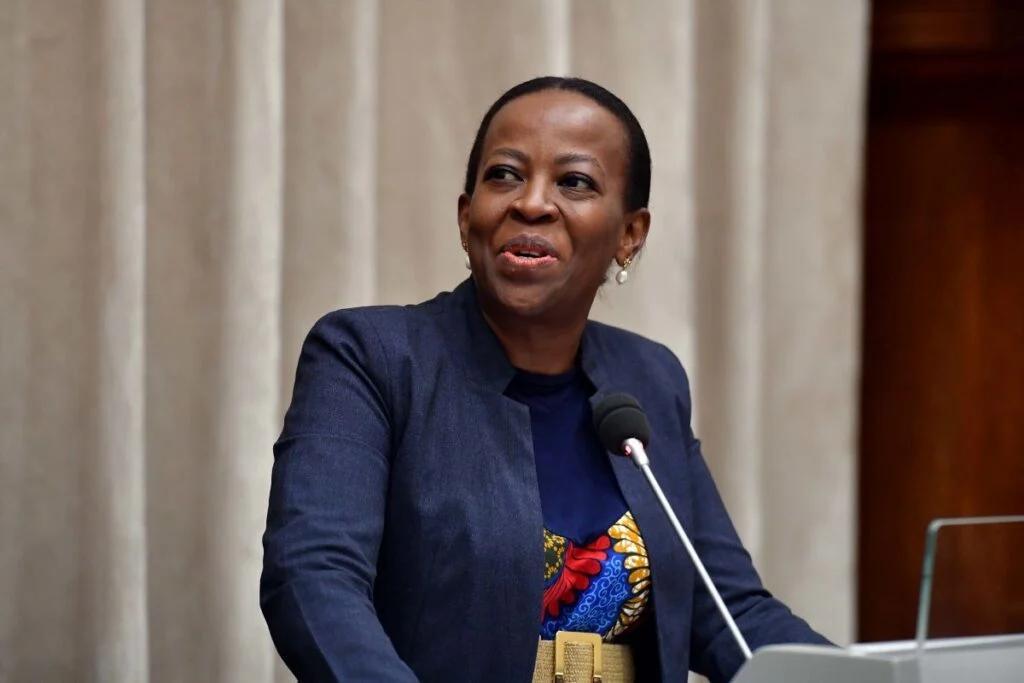Africa-Press – South-Africa. Minister in the Presidency responsible for Planning, Monitoring and Evaluation Maropene Ramokopga says that state-owned enterprises (SOEs) will no longer be controlled by their line departments.
Following the creation of the Government of National Unity (GNU) and the scrapping of the Department of Public Enterprises, President Cyril Ramaphosa announced that Ramokopga will be responsible for creating a state-owned holding company to manage the finances of SOEs.
Speaking with the Business Times, Ramokopga said that she would push through the National State Enterprises Bill (NSEB) currently before parliament, which Pravin Gordhan, the previous Minister of Public Enterprises, previously tabled.
If enacted in its current form, the bill will:
Enable the development of a ‘national strategy’ for state-owned enterprises.
Establish the State Asset Management SOC Limited (SAMSOC), with the state as its sole shareholder.
Consolidate the state’s shareholdings in “strategic” SOEs through a centralised shareholder model;
Phase in these enterprises as subsidiaries of SAMSOC over time.
Although not every local, provincial and state SOE will be transferred to SAMSOC, those earmarked for the move include:
Eskom Holdings SOC Limited;
Transnet SOC Limited;
South African Airways SOC Limited;
South African Post Office SOC Limited;
South African National Roads Agency Limited;
Denel SOC Limited;
Air Traffic and Navigation Services Company Limited;
Airports Company Limited;
Broadband Infraco SOC Ltd;
Central Energy Fund (Pty) Limited;
Sentech SOC Limited;
South African Forestry Company SOC Limited;
South African Nuclear Energy Corporation Limited.
However, Ramokopga’s comments suggest a change in how these SOEs will be managed to what was previously envisioned in the NSEB Bill.
These SOEs, which were previously supervised by the Department of Public Enterprises, were supposed to fall under their respective policy departments.
These departments would then act as shareholder representatives for SAMSOC.
For instance, the shareholder representative of Eskom would have been the Minister of Energy and Electricity, Kgosientsho Ramokgopa, while the Minister of Transport, Barbara Creecy, would have represented Transnet.
There are still question marks over what SAMSOC will ultimately look like, but the government was apparently impressed by Singapore’s Temasek Holdings.
Ramokopga said placing strategic SOEs in a holding company is meant to stabilise them so they could become profitable and operate off their balance sheets.
She added that the creation of SAMSOC would not translate into privatisation as the government would remain the sole shareholder of these entities.
Ramokopga’s change of heart could create tension within the ANC, as the party stated at its 2017 and 2022 conferences that all SOEs must be transferred to their policy departments.
South Africa’s SOEs have been a serious drain on the fiscus, requiring bailouts in the billions from the National Treasury due to mismanagement, particularly Eskom.
No private equity
Ramokopga also disagreed with the idea of selling equity stakes in SOEs.
She said that the government should rather have private operators to help manage SOEs while they remain 100% state-owned.
This follows the failed sale of 51% of South African Airways to the Takatso Consortium.
Ramokogpa said that she is a fan of partnerships in which the state owns 100%, and a third party acts as an operating partner. These could include 10- to 30-year contracts.
However, she said that she would meet with the President to hear his thoughts on SOEs.
For More News And Analysis About South-Africa Follow Africa-Press






